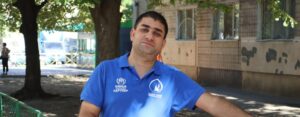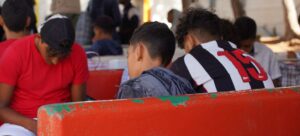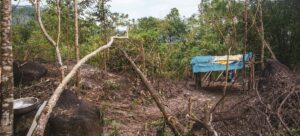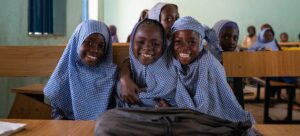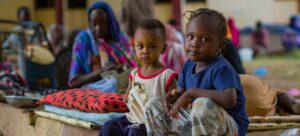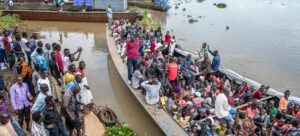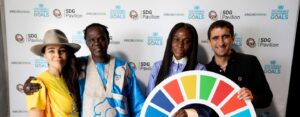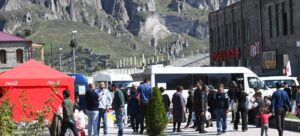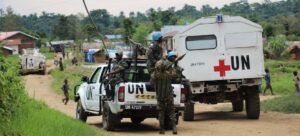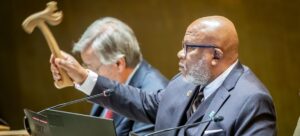And a busy stage it was. The big week of UNGA’s 78th session was triple focused on health, climate change, and turbocharging the race midway to realizing the Sustainable Development Goals (SDGs).
While world leaders’ report cards on this global stage have traditionally headlined past UNGA sessions, recent years have seen a growing number of non-diplomats, from movie stars to grassroots organizers, stepping up on the sidelines.
They all echoed a universal call to ramp up progress at the halfway point to realizing the 2030 Agenda and its 17 Goals (SDGs). But other vital issues were on the table at the first fully in-person UNGA since the outbreak of the global COVID-19 pandemic in 2020.
UNGA 78 also left us wondering how much the buzz of alternative voices – ringing out beyond the iconic, green-marbled podium of the General Assembly Hall – made a dent on the formal proceedings. Were they being heard? We asked. They answered.
Rachel Sterling and Nancy Rhodes, co-founders of alternew, a sustainable fashion software company based in the United States.
‘We’re not suits’
Cobblers were among the missing on-the-ground gamechangers at UNGA 78, according to Rachel Sterling and Nancy Rhodes, co-founders of alternew. Their US-based company provides business software to help tailors, shoemakers, watch, and jewellery repairers to connect with consumers to buck fast fashion and create a circular economy that promotes sustainable consumption (SDG 12).
“Even if you’re a tailor, cobbler, or jeweller, you’re playing a fundamental role in the circular economy,” Ms. Sterling said near the SDG Media Zone which sat in the shadow of the UN General Assembly building.
The sustainable trendsetter told UN News that as she was gearing up for UNGA 78, she struggled with what to wear.
“We’re not suits,” she said, but in the end, expecting a corporate-style setting, she traded sneakers for heels.
My message for world leaders is ‘You cannot negotiate with nature; history will not remember you by how much profit you made’ if they do not save our planet. – Ayisha Siddiqi, SDG Climate Youth Advocate from Pakistan
Break down ‘silos’
While happy to participate in discussions on the sidelines, they agreed that their voices and others could be better heard inside UN Headquarters.
“To shake things up, silos must come down,” Ms. Rhodes said.
A case in point is that the fossil fuel crowd and the sustainable fashion advocates attending UNGA were having separate conversations when they really are aiming at the same goals: reduce emissions and promote green energy alongside sustainable consumption and production, she explained.
Language barriers must also be eliminated, Ms. Rhodes said.
“It’s about making everyone part of the solution,” Ms. Sterling said. “It’s not just the English-speaking world that can solve this.”
First time at ‘UN house’
Across the North Lawn of UN Headquarters, celebrities were posing for selfies outside the 17 Rooms exhibit, installed to promote accelerated action to realize the SDGs. The semi-circle “pavilion” featured doorways to surprise art installations, each representing one of the Goals.
Outside the door leading to SDG 16 on peace, security, and strong institutions, Nigerian stars and influencers Alhaníslam and Rahama Sadau posed for a photo with a fan.
“As an actress, I felt the biggest impact I could have is to lend my voice,” said Ms. Sadau, who has three million social media followers and advocates for education (SDG 4) and partnerships (SDG 17).
Alhaníslam, who co-wrote, with Congolese poet Pacifique Akilimali, Peace Begins With Me on the occasion of the 75th anniversary of UN peacekeeping, said she uses her voice to amplify the work done in local communities.
Poet Alhaníslam and actor Rahama Sadau pose for a photo with a fan.
‘My voice has been heard’
“I believe my voice has been heard,” she said. “People have been sending me messages that they are inspired.”
Opening up door 16, she said, “you can find this”, pointing to the Poem for Peace, written and recorded by Malian poet Salimata Fofana, who shared the harsh reality of a childhood defined by war.
‘Room for new ideas’
The UN could “do more in getting diverse young people to participate in all the work they’re doing”, Alhaníslam said. One way would be to have a “talent scout team” in various communities to “find new voices that are doing different things to solve problems”.
“There should be room for new ideas,” she said.
‘We know the solutions’
“We have a huge task ahead of us and all systems must respond,” said Temilade Salami, an environmentalist and marine biologist involved with youth-led sustainability initiatives across Nigeria.
“The time for action is now”, she said while moderating a talk on education at the SDG Pavilion last week. “We know that education can play a part in changing mindsets and building skills to mitigate and adapt as our planet changes.”
I’m here to ask world leaders to step up action on climate change. – Vishal Prasad, Fiji, which is on “the frontlines of the climate crisis”, with 40 villages currently in need of relocating
“One of the ways you can encourage young people like myself is to make sure that you support the work that we’re doing back at home because we are the ones who are closest to these problems, and we know the solutions that properly fit our communities,” Ms. Salami said.
Julieta Martinez, founder of the education group Fundación Tremendas in Chile, agreed.
“We have projects. So, work with us, and you’ll see how many great projects we can do because nobody understands the problems that young people are facing but themselves.”
Others UN News spoke with echoed her call, including Varaidzo Kativhu, an education activist from Zimbabwe who uses her audience of 300,000 social media followers to help to promote empowering unsupported and underrepresented students in recognizing their academic potential.
Young people “want meaningful engagement” she said at the meeting on the Summit of the Future. “We want to be at the table where decisions are being made. Please stop talking about us and start talking to us, and not only talking to us but working with us.”
Education activist Varaidzo Kativhu addresses the Summit of the Future at UN Headquarters in New York.
‘Trying to capture everything’
At the end of the week, the main stage in the General Assembly Hall attracted presidents, prime ministers, and nearly 3,000 journalists from across the world.
Yvette Tanamal, a reporter from the Jakarta Post who was covering UNGA’s high-level week for the first time, summed up the general feeling against the backdrop of “hundreds of events and thousands of bilaterals”.
“It’s been really fun, especially the adrenalin you feel trying to capture everything,” she said, adding sage advice for other UNGA newcomers: “Wear comfortable shoes.”
What walking the talk looks like
In contrast to the sombre voices of world leaders, UN Headquarters was transformed by hundreds of activists who took part in a dizzying carousel of events, with the UN Secretary-General welcoming these “movers and doers”.
Walking the talk was what these passionate young participants had in common, as they head home to their communities to continue their valuable work:
- Chile: Julieta Martinez, author of No Soy Julieta, a book about her experiences in business and social activism, became a UN-Women adviser at age 16, and founded Fundación Tremendas, with more than 1,500 volunteers in 18 countries focused on realizing the SDGs.
- Nigeria: Rahama Sadau raised awareness to stop child marriage and founded the Ray of Hope Foundation, reaching children most in need to spread gender quality and empower women and girls (SDG 5).
- Nigeria: Temilade Salami founded EcoChampions, one of Africa’s largest networks of young environmentalists, with programmes in 26 countries (SDG 13).
- Zimbabwe: Varaidzo Kativhu wrote EMPOWERED, a practical self-help book for young people, volunteers for education-focused charities, is an active ambassador for United World Schools, CAMFED, and GirlUp Zimbabwe, and founded Empowered By Vee, which has more than 17,600 students in its network (SDG 4).


